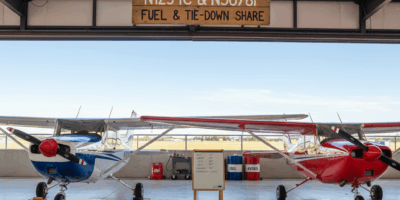How to Find the Best Hangar Rental Deals
How to Find the Best Hangar Rental Deals
Finding the best hangar rental deals requires a mix of research, networking, and timing. Aircraft owners know how crucial it is to have a safe and reliable place to store their planes. Let’s explore some practical steps you can take to secure a great deal on a hangar rental.
Understand Your Needs

Assess the size and type of hangar you need. Different aircraft have varying storage requirements. Small planes may fit into smaller T-hangars, while larger jets need more spacious box hangars. Knowing your requirements ahead of time will streamline your search.
Research Local Options
Begin by researching hangar rental options at your local airports. Many airports list available hangars on their websites. Visit or call airport management offices for detailed information. Also, smaller airports may offer more competitive rates than larger ones.
Check Online Marketplaces
Several online platforms specialize in listing hangar rentals. Websites like HangarTrader, Trade-A-Plane, and Aerotrader provide a variety of listings. These platforms allow you to compare prices and specifications of different hangar rentals easily.
Network Within the Aviation Community
Network with local pilots and aviation clubs. Often, the best deals are shared through word of mouth. Joining social media groups and aviation forums can provide insider information on hangar availability and pricing.
Investigate Hidden Costs
Look out for hidden costs in hangar rental agreements. These can include utility fees, maintenance charges, and access fees. Read the contract thoroughly and ask for a breakdown of all potential costs before signing.
Consider Hangar Location
Location impacts price and convenience. Hangars closer to major city centers or popular airports may cost more. Evaluate whether paying a premium for a more convenient location is worth it. Sometimes, a slightly farther hangar with lower rent can be a better deal.
Compare Long-Term and Short-Term Leases
Some airports offer discounts on long-term leases. If you plan to store your aircraft for an extended time, committing to a longer lease can save money. Short-term leases provide flexibility but may come at a higher monthly rate.
Negotiate the Lease Terms
Don’t hesitate to negotiate the lease terms. Airport management may offer discounts for upfront payments or longer lease commitments. It’s also worth asking for any available promotions or discounts.
Evaluate Hangar Amenities
Determine which amenities are essential for you. Some hangars include climate control, security systems, or maintenance services. Amenities can drive up the cost, so prioritize what you truly need to find the best value.
Join Waitlists
If your preferred hangar is currently unavailable, consider joining a waitlist. Many airports maintain waitlists for hangar rentals. Being on these lists can give you a chance at a better deal when space becomes available.
Monitor Seasonal Trends
Hangar availability and prices can fluctuate seasonally. Winter may see higher demand in colder regions as more aircraft need shelter. Understanding these trends can help you time your rental to secure better rates.
Look for Sublease Opportunities
Some aircraft owners temporarily sublease their hangars when they’re not using them. Subleasing can offer short-term savings. Check with local pilot groups or online forums for sublease opportunities.
Utilize Business and Personal Connections
Leverage any business or personal connections you have in the aviation industry. Sometimes, knowing the right people can lead to more favorable rental deals. It’s always worth reaching out to see what opportunities might arise.
Consider Shared Hangar Spaces
Shared hangar spaces, where multiple aircraft owners share a single hangar, can reduce costs significantly. This arrangement requires coordination and trust among the users but can be a cost-effective solution.
Analyze the Airport’s Reputation
Choose an airport with a good reputation for customer service and facility maintenance. Reviews and testimonials from other pilots can provide insights. A well-maintained hangar in a reputable airport can be a better investment even at a slightly higher cost.
Inspect the Hangar
Physically inspect any potential hangars before finalizing the rental. Check for any signs of damage, water leaks, or pest infestations. Ensure the hangar meets your standards for security and cleanliness.
Document Everything
Document the state of the hangar before moving your aircraft in. Take photos and notes of any existing damage. This documentation can protect you from future disputes regarding the condition of the hangar.
Plan for Future Growth
If you plan on expanding your aircraft fleet, consider whether the hangar can accommodate future growth. Choosing a slightly larger hangar now can save you the hassle of relocating later.
Secure Insurance
Ensure you have adequate insurance coverage for your aircraft while it’s in the hangar. Some airports may require proof of insurance. Additionally, consider reviewing the insurance policies offered by the rental provider for any gaps in coverage.
Understand the Cancellation Terms
Carefully read and understand the contract’s cancellation terms. Knowing the notice period and any associated penalties can save you from unexpected charges if you need to terminate the lease early.
Seek Legal Advice if Necessary
If the rental agreement is complex, consider seeking legal advice. A legal expert can clarify the terms and ensure your interests are protected. This step can prevent misunderstandings and future legal issues.
Stay Updated on Market Rates
Keep an eye on current market rates for hangar rentals. Understanding the going rates will help you recognize a good deal when you see one. Regularly checking prices ensures you stay informed about the latest trends.
Be Ready to Act Quickly
Great deals on hangar rentals can go quickly. Be prepared to act fast when you find a suitable option. Having your documentation ready and being financially prepared can give you an edge in securing the hangar.
Recommended Aviation Resources
Pilots Handbook of Aeronautical Knowledge – $25.42
Essential FAA handbook for every pilot.
Aircraft Owners Handbook of Maintenance
Keep your aircraft in top condition.
As an Amazon Associate, we earn from qualifying purchases.



